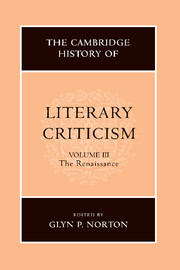Book contents
- Frontmatter
- Introduction
- READING AND INTERPRETATION: AN EMERGING DISCOURSE OF POETICS
- POETICS
- THEORIES OF PROSE FICTION
- CONTEXTS OF CRITICISM: METROPOLITAN CULTURE AND SOCIO-LITERARY ENVIRONMENTS
- VOICES OF DISSENT
- STRUCTURES OF THOUGHT
- NEOCLASSICAL ISSUES: BEAUTY, JUDGEMENT, PERSUASION, POLEMICS
- A SURVEY OF NATIONAL DEVELOPMENTS
- 56 Seventeenth-century English literary criticism: classical values, English texts and contexts
- 57 French criticism in the seventeenth century
- 58 Literary-critical developments in sixteenth-and seventeenth-century Italy
- 59 Cultural commentary in seventeenth–century Spain: literary theory and textual practice
- 60 The German-speaking countries
- 61 The Low Countries
- Bibliography
- Index
- References
59 - Cultural commentary in seventeenth–century Spain: literary theory and textual practice
from A SURVEY OF NATIONAL DEVELOPMENTS
Published online by Cambridge University Press: 28 March 2008
- Frontmatter
- Introduction
- READING AND INTERPRETATION: AN EMERGING DISCOURSE OF POETICS
- POETICS
- THEORIES OF PROSE FICTION
- CONTEXTS OF CRITICISM: METROPOLITAN CULTURE AND SOCIO-LITERARY ENVIRONMENTS
- VOICES OF DISSENT
- STRUCTURES OF THOUGHT
- NEOCLASSICAL ISSUES: BEAUTY, JUDGEMENT, PERSUASION, POLEMICS
- A SURVEY OF NATIONAL DEVELOPMENTS
- 56 Seventeenth-century English literary criticism: classical values, English texts and contexts
- 57 French criticism in the seventeenth century
- 58 Literary-critical developments in sixteenth-and seventeenth-century Italy
- 59 Cultural commentary in seventeenth–century Spain: literary theory and textual practice
- 60 The German-speaking countries
- 61 The Low Countries
- Bibliography
- Index
- References
Summary
Seventeenth–century Spain (alternately referred to as part of the ‘Golden Age’, as the Baroque, or, more recently, as ‘Early Modern Spain’) was, like our own post–modern era, analytical, self–reflexive, and sceptical, a period as committed to cultural commentary and even indictment – in spite of the repressive ethos of the Counter–Reformation. As a result of the inevitable controversies which ensued, this period, like today's postmodernism, stages an ongoing interrogation of categories in a variety of ways that are visible both in the literature and art being produced at that time and in the provocative theorizing to which they gave rise.
In terms of literary production, both periods likewise concern themselves very centrally with the power and constraints of mimesis. Like postmodernism, the Baroque is the cultural expression of a society bent on critically appraising the myths of the preceding era which viewed itself as paradigmatically ‘modern’. Both movements undermine a humanist vision – be it that of Erasmian humanism or secular humanism. Both likewise overtly discredit utopic cultural structures – be they imperial or Marxist. In other words, both demythologize – that is what the crisis of legitimacy is all about. The Baroque like post–modernism is much more form–conscious than the age that preceded it, and to which it is responding. The existence of these two movements, in addition, was first perceived in the plastic arts and only thereafter in literature. Both exploit the same literary figures: antithesis, oxymoron, paradox, catachresis, hyperbole, and example.
- Type
- Chapter
- Information
- The Cambridge History of Literary Criticism , pp. 578 - 590Publisher: Cambridge University PressPrint publication year: 1999



